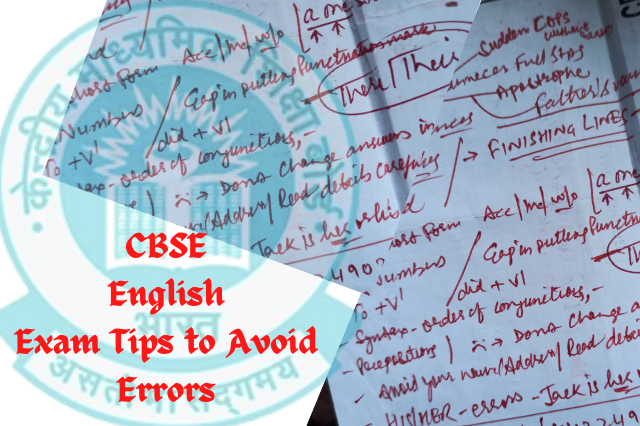Examination brings a fever of preparations and planning. There is no end to what you can prepare and learn. When it comes to English Core in XII and X, CBSE makes question papers to check your writing skills and your understanding of what was asked to read. I once checked the answer sheets for CBSE last year and made some notes as an evaluator. Here come the much-awaited scribbles on the paper.
How to score marks in English?
Me: Write well! Write Errorless!
We always ask for the secret to succeed and never find an exact idea to accomplish that. But the formula to fail is only one - MAKE MISTAKES!
Do Not be a generation of Cheaters!
In the exam of English, most of the students believe in writing and writing endlessly. Some of them of course write less but that also costs them some loss in marks. The most crucial part is not the literature questions or even the grammar questions - you know the most complex thing is the way you write the answers. The number of errors affects the marks an examiner will award to the student.
One fact, based on the views given by teachers evaluating the answer sheets for more than a decade is that CBSE is 100% student-friendly. The KEY and the guidelines that are sent to the evaluation centres clearly say that students will get marks if the answer gives an idea of the 'real' answer. No marks are deducted for an error repeated.
The letter sent as a confidential one also says positively about learning because it encourages the evaluators to reward when they see a possible answer in the passage by a student. All in all, one has to avoid the RED PEN and that is the secret to making the evaluator give you more marks. Why do they put those RED CIRCLES around your words? Because of some very small- childish errors!
So you need to minimise the errors in writing English. What type of errors you do and how can you avoid them, is what this blog is all about.
- The primary enemy of you is Subject-Verb Errors. This is done as a topic from your 9 grade onwards but fail to keep it perfect in the exam. Do not forget that SVA is not just for fill-in-the-blank grammar. If I writes here you is going to find it. These are the easiest targets of the RED PEN of the evaluator. Stay ALERT!
- Tenses are related to the TIME ZONE of the action you are writing about. If you are writing a memory - it goes for the Past tense. If it is an observation rooted in the present experience, it calls for the Present tense and imagination or prediction will be in the Future tense. We know this, so we better carry this to the exam hall as well.
- Article Determiners - A, An and The - this trio is probably the most troubling thing in INDIAN writing now. We seem to have no regard for this. These are just omitted. If you want to say A Question or An Answer then say it exactly that way. See, those who check your answers are teachers from age which might be 30 years to 60 years. It means they belong to an English which respects Grammar rules. Do not forget to revise and respect A - An - The.
- Punctuation is about adding meaning to what we write. Meaningless writing will never be able to get you marks. Do not write as if you are voice-typing. Read this:
Let's Eat Teacher - Let's Eat, Teacher
Better it would be to avoid eating the teacher and ask the teacher to join you in eating. So, do not make them eat the marks. There are two types of Punctuation errors: 1- the routine ones where you miss a full stop or comma and the serious ones - where you add a mark without need and you do not bother o add even one. Apostrophe, in the father's name, is important. There is NO NEED TO WRITE IN capital letters when not asked. Do not ignore this thing.
- The order to attempt can be varied according to your strength of learning. But, I shall advise picking Writing parts first because there is a defined and limited size and word limit to them. If you know the correct format, you can do it quickly. The Notice goes for 1 page and a letter can take one and a half pages, I feel. After writing, you can do literature and other matter. At last, you can hunt the Reading Comprehension.
- Prefer Short Sentences: What happens when you are writing and writing and there is no full stop because you are just adding conjunction to make long sentences which you feel will divert the reader as the reader has been reading so many papers so your paper can get ignored by your luck which you feel you always carry with you!!! > How do you feel after reading this? Strange! So avoid making long sentences unnecessarily. because it is easy to read short sentences.
- Do not add THE with Proper Nouns. The India or The John is not correct.
- Following your school life habits, you can add finishing lines _______ with a pencil after you complete an answer. Adding finishing lines will let the reader see that you are an organised person.
- AND is written as and not as &. So avoid using the symbol, write the word because the exam is not our WhatsApp chat.
- Avoid Short Forms without mentioning the full forms. There is no need to make abbreviations as we do in class notes. Acc. to me w/o writing proper sent. we do not get good marks. Go for According - Without - avoiding the shortcuts.
- YES! This is crucial - where most of us will look at our colleagues and ask them what to do - this child has not mentioned which question has been attempted. If you leave it to me to check that, I shall not appreciate the student and the 'feelings' in checking will be strict. So, ensure the PROPER QUESTION NUMBER and also the Sub-parts.
- Many students forget the basic rules of using verbs and tenses - To + V1 and Did + V1 (Because DID is the second form to show Past Simple, so the verb will remain V1, many students write Did WENT > It should be DID GO.)
- Ok > Listen > DO NOT CHANGE YOUR ANSWERS IN GRAMMAR QUESTIONS JUST BECAUSE YOU HAVE DOUBT AND SOME FRIEND HAS GIVEN YOU A HINT! You know, later we find that what we CUT, was the correct answer. Overwriting is also harmful to you.
- In the questions where we are asked to write letters/application letters or even other composition tasks - READ THE STATEMENTS CAREFULLY for possible Traps. The HIS/HER or She/He should be checked.
- Your answer sheet is not checked by just ONE Person. It goes through two people officially and being co-evaluators, discussions can also take place if there is confusion.
- Parts of Speech should also be kept in mind. You can believe or belief? You can HAVE a belief (noun) and You can believe (verb) such errors should not happen. Listen to this Podcast for a better understanding of PoS.
- Clean handwriting is a good thing. There is a need to write neatly and keep things looking good. However, amazing handwriting without correct answers will NOT get you marks.
- In Reading Comprehension, DO NOT COPY the exact sentences from the passage. However, you know, CBSE suggests that you can get marks just for the mention of the information asked.
- Always look at how many MARKS are on offer for the question. The word limit depends on that.
- Read the whole question paper in the beginning to give you a good reading of words.
- last but not the least, Spelling cannot be incorect. It makes it a paper of red-blood-shed then. Errors are easy in spelling and there can be a saddistic pleasure in deducting your marks. So Stay Safe!
I shall suggest that you read VERBS before the exam. It can be a good idea to go through the Oxford 3000 vocabulary so that you can write what you think. When English is not your FIRST language, you do face such a challenge. The solution is to strengthen your stock of words.
CBSE has introduced a very interesting platform for students and schools where they will get learning materials, circulars and question banks for exams. This is called Pariksha Sangam and can be accessed HERE.







